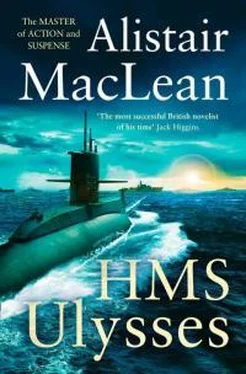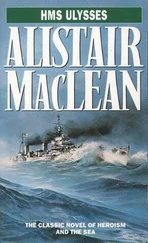But what the three men really wanted to know, Nicholls realized, was how the Ulysses had been, how a crew of mutineers had borne themselves. He had told them, he knew, things of wonder and of splendour, and they could not reconcile these with men who would take up arms against their own ship, in effect, against their own King.
So Nicholls tried to tell them, then knew, as he tried, that he could never tell them. For what was there to tell? That Vallery had spoken to the men over the broadcast system: how he had gone among them and made them almost as himself, on that grim, exhausting tour of inspection: how he had spoken of them as he died: and how, most of all, his death had made them men again? For that was all that there was to tell, and these things were just nothing at all. With sudden insight, Nicholls saw that the meaning of that strange transformation of the men of the Ulysses , a transformation of bitter, broken men to men above themselves, could neither be explained nor understood, for all the meaning was in Vallery, and Vallery was dead.
Nicholls felt tired, now, desperately so. He knew he was far from well. His mind was cloudy, hazy in retrospect, and he was mixing things up: his sense of chronological time was gone, he was full of hesitations and uncertainties. Suddenly he was overwhelmed by the futility of it all, and he broke off slowly, his voice trailing into silence.
Vaguely, he heard the grey-haired man ask something in a quiet voice, and he muttered aloud, unthinking.
‘What was that? What did you say?’ The greyhaired man was looking at him strangely. The face of the Admiral behind the table was impassive. Starr’s, he saw, was open in disbelief.
‘I only said, “They were the best crew God ever gave a Captain,”’ Nicholls murmured.
‘I see.’ The old, tired eyes looked at him steadily, but there was no other comment. Fingers drumming on the table, he looked slowly at the two Admirals, then back to Nicholls again.
‘Take things easy for a minute, boy . . . If you’ll just excuse us . . .’
He rose to his feet, walked slowly over to the big, bay windows at the other end of the long room, the others following. Nicholls made no move, did not even look after them: he sat slumped in the chair, looking dejectedly, unseeingly, at the crutches on the floor between his feet.
From time to time, he could hear a murmur of voices. Starr’s high-pitched voice carried most clearly. ‘Mutiny ship, sir . . . never the same again . . . better this way.’ There was murmured reply, too low to catch, then he heard Starr saying, ‘ . . . finished as a fighting unit’. The grey-haired man said something rapidly, his tone sharp with disagreement, but the words were blurred. Then the deep, heavy voice of the Fleet Admiral said something about ‘expiation’, and the grey-haired man nodded slowly. Then Starr looked at him over his shoulder, and Nicholls knew they were talking about him. He thought he heard the words ‘not well’ and ‘frightful strain’, but perhaps he was imagining it.
Anyway, he no longer cared. He was anxious for one thing only, and that was to be gone. He felt an alien in an alien land, and whether they believed him or not no longer mattered. He did not belong here, where everything was so sane and commonplace and real – and withal a world of shadows.
He wondered what the Kapok Kid would have said had he been here, and smiled in fond reminiscence: the language would have been terrible, the comments rich and barbed and pungent. Then he wondered what Vallery would have said, and he smiled again at the simplicity of it all, for Vallery would have said: ‘Do not judge them, for they do not understand.’
Gradually, he became aware that the murmuring had ceased, that the three men were standing above him. His smile faded, and he looked up slowly to see them looking down strangely at him, their eyes full of concern.
‘I’m damnably sorry, boy,’ the grey-haired man said sincerely. ‘You’re a sick man and we’ve asked far too much of you. A drink, Nicholls? It was most remiss–’
‘No, thank you, sir.’ Nicholls straightened himself in his chair. ‘I’ll be perfectly all right.’ He hesitated. ‘Is – is there anything else?’
‘No, nothing at all.’ The smile was genuine, friendly. ‘You’ve been a great help to us, Lieutenant, a great help. And a fine report. Thank you very much indeed.’
A liar and a gentleman, Nicholls thought gratefully. He struggled to his feet, reached out for his crutches. He shook hands with Starr and the Admiral of the Fleet, and said goodbye. The greyhaired man accompanied him to the door, his hand beneath Nicholls’s arm.
At the door Nicholls paused.
‘Sorry to bother you but – when do I begin my leave, sir?’
‘As from now,’ the other said emphatically. ‘And have a good time. God knows you’ve earned it, my boy . . . Where are you going?’
‘Henley, sir.’
‘Henley! I could have sworn you were Scots.’
‘I am, sir – I have no family.’
‘Oh . . . A girl, Lieutenant?’
Nicholls nodded silently.
The grey-haired man clapped him on the shoulder, and smiled gently.
‘Pretty, I’ll be bound?’
Nicholls looked at him, looked away to where the sentry was already holding open the street doors, and gathered up his crutches.
‘I don’t know, sir,’ he said quietly. ‘I don’t know at all, I’ve never seen her.’
He tip-tapped his way across the marble flags, passed through the heavy doors and limped out into the sunshine.
I wish to acknowledge my debt to my elder brother, Ian L. MacLean, Master Mariner, for the considerable technical help and advice on matters maritime given me in the preparation of this book.
To avoid possible confusion it must be clearly stated that there is no connection whatsoever between the HMS Ulysses of this book and the Ulster-class destroyer – now fully converted to a frigate – of the same name which entered operational service in the early part of 1944, some 12 months after the events described in this book. Nor is there any connection between any ship herein mentioned as being in Scapa Flow or participating in the convoy and any naval ship of the same name that has served, or is serving, in the Royal Navy.
A.M.
Rescue ships, whose duties were solely what their name implies, were a feature of many of the earlier convoys. The Zafaaran was lost in one of the war’s worst convoys. The Stockport was torpedoed. She was lost with all hands, including all those survivors rescued from other sunken ships.
Cam-ships were merchant ships with specially strengthened fo’c’sles. On these were fitted fore-and-aft angled ramps from which fighter planes, such as modified Hurricanes, were catapulted for convoy defence. After breaking off action, the pilot had either to bale out or land in the sea. ‘Hazardous’ is rather an inadequate word to describe the duties of this handful of very gallant pilots: the chances of survival were not high.
The Dumaresq was a miniature plotting table on which such relevant factors as corresponding speeds and courses were worked out to provide firing tracks for the torpedoes.
HMS Spartiate was a shore establishment. Naval HQ for the West of Scotland. It was at St Enoch’s Hotel, Glasgow.
PQ17, a large mixed convoy – it included over 30 British, American and Panamanian ships – left Iceland for Russia under the escort of half a dozen destroyers and perhaps a dozen smaller craft, with a mixed Anglo-American cruiser and destroyer squadron in immediate support. A shadow covering force – again Anglo-American – comprising one aircraft carrier, two battleships, three cruisers and a flotilla of destroyers, lay to the north. As with FR77, they formed the spring of the trap that closed too late. The time was midsummer, 1942, a suicidal season for the attempt, for in June and July, in these high latitudes, there is no night. About longitude 20° east, the convoy was heavily attacked by U-boats and aircraft. On the same day as the attack began – 4th July – the covering cruiser squadron was radioed that the Tirpitz had just sailed from Alta Fjord. (This was not the case: The Tirpitz did make a brief, abortive sortie on the afternoon of the 5th, but turned back the same evening: rumour had it that she had been damaged by torpedoes from a Russian submarine.) The support squadron and convoy escorts immediately withdrew to the west at high speed, leaving PQ17 to their fate, leaving them to scatter and make their unescorted way to Russia as best they could. The feelings of the crews of the merchant ships at this save-their-own-skins desertion and betrayal by the Royal Navy can be readily imagined. Their fears, too, can be readily imagined, but even their darkest forebodings never conceived the dreadful reality: 23 merchant ships were sent to the bottom – by U-boats and aircraft. The Tirpitz was not seen, never came anywhere near the convoy, but even the threat had driven the naval squadrons to flight. The author does not know all the facts concerning PQ17, nor does he seek to interpret those he does know: still less does he seek to assign blame. Curiously enough, the only definite conclusion is that no blame can be attached to the commander of the squadron, Admiral Hamilton. He had no part of the decision to withdraw – the order came from the Admiralty, and was imperative. But one does not envy him. It was a melancholy and bitter incident, all the more unpalatable in that it ran so directly counter to the traditions of a great Service; one wonders what Sir Philip Sydney would have thought, or, in more modern times, Kennedy of the Rawalpindi or Fegen of the Jervis Bay . But there was no doubt what the Merchant Navy thought. What they still think. From most of the few survivors, there can be no hope of forgiveness. They will, probably, always remember: the Royal Navy would desperately like to forget. It is difficult to blame either.
Читать дальше
Конец ознакомительного отрывка
Купить книгу










